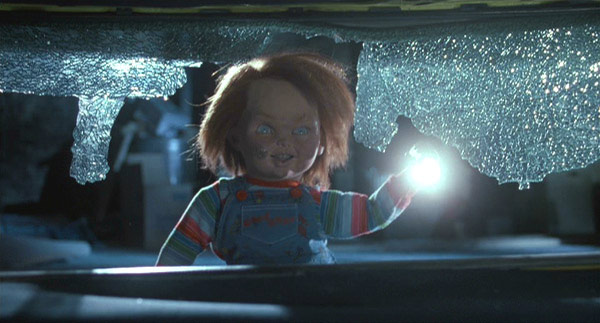
CHILD’S PLAY
***/****
DVD – Image A- Sound A- Extras B+
BD – Image A Sound A Extras B+
starring Catherine Hicks, Chris Sarandon, Alex Vincent, Brad Dourif
screenplay by Don Mancini and John Lafia and Tom Holland
directed by Tom Holland
CHILD’S PLAY 2 (1990)
**/**** Image C+ Sound A-
starring Alex Vincent, Jenny Agutter, Gerrit Graham, Brad Dourif
screenplay by Don Mancini
directed by John Lafia
CHILD’S PLAY 3 (1991)
*/**** Image B- Sound A-
starring Justin Whalin, Perrey Reeves, Jeremy Sylvers, Brad Dourif
screenplay by Don Mancini
directed by Jack Bender
BRIDE OF CHUCKY (1998)
**/**** Image B Sound B Extras C
starring Jennifer Tilly, Brad Dourif, Katherine Heigl, Nick Stabile
screenplay by Don Mancini
directed by Ronny Yu
SEED OF CHUCKY (2004)
*/**** Image A- Sound B Extras C-
starring Jennifer Tilly, Brad Dourif, Billy Boyd, Redman
written and directed by Don Mancini
by Ian Pugh SPOILER WARNING IN EFFECT. Twenty years and four sequels later, it’s obviously pointless to try to conceal that Child’s Play is about a serial killer (Brad Dourif) who transfers his soul into an innocuous doll, but watching it today–more than a decade after it thoroughly traumatized me as an impressionable preteen–I was surprised to learn that the film itself didn’t do much to hide that fact from the start. Oh, sure, when you first approach Child’s Play, you’re ostensibly supposed to wonder whether little Andy Barclay (Alex Vincent) is responsible for the murders peppered throughout, despite his loud protestations that Chucky did it. But no, it never really tries to pretend that these horrible acts are being committed by anyone other than that godawful doll. In taking that perspective, Child’s Play preys upon the irrational fears we all harbour–that sting of dread we get at the sight of an unintentionally unsettling toy, immediately wished away by safe, immutable reason: that’s impossible–a doll can’t hurt you.


